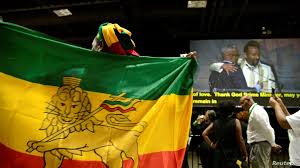By Marthe van der Wolf

AMSTERDAM – With more than 2.5 million Ethiopians living outside of Ethiopia, the diaspora community is not only large, but influential.
When members of the Oromo, Ethiopia’s largest ethnic group, took to the streets in 2015, saying they were economically marginalized, the diaspora supported them through social media activism and satellite television stations. The anti-government protests preceded the resignation of then-Prime Minister Hailemariam Desalegn in 2018.

Awol Allo, a senior lecturer at Britain’s Keele University, regularly tweets about political and Oromo developments, but does not consider himself an activist. Allo says the diaspora’s activity and influence depend on how the Ethiopian government is responding when it comes to freedom of expression.
“When this government came to power, for a time, the role of the diaspora actually declined because people were able to express their views,” he said. “So, essentially, Ethiopian politics moved back to the country when the opposition political parties moved back to the country. Now, we are seeing the resurgence of diaspora voices because the government arrested some of those opposition politicians who moved back from the diaspora to Ethiopia to operate on the ground.”
Unrest in Ethiopia flared again in late June following the assassination of Hachalu Hundessa, a popular Oromo singer and activist whose songs were considered the soundtrack of the Oromo protest movement. His death was followed by street protests that turned violent. Police then arrested opposition politicians, including prominent Oromo figures.
The government, led by Prime Minister Abiy Ahmed, who is an Oromo himself, also switched off the internet for 15 days.
Endalk Chala, co-founder of the blogging collective Zone9, and an assistant professor at Hamline University in the U.S. state of Minnesota, says the diaspora’s large role is due to the lack of independent media at home.
“There are two diaspora media outlets, Ethiopian Satellite TV and Oromo Media Network, who had been giving wall-to-wall coverage of the protest on the ground,” he said. “And people on the ground didn’t have any other alternative because there was no media, opposition media or independent media for that matter in the country, so people didn’t have any option than turning to these two media outlets.”
The current government’s national unity agenda initially had popular support, and many exiled opposition figures and politicians returned to the country. In 2018, the government invited Ethiopian Satellite TV and Oromo Media Network to operate from Ethiopia.
Many other Ethiopians also returned in the hopes of contributing to the change.
Ermias Kebede, who organizes youth events for the community in London, moved back to Ethiopia in 2019 but says he soon realized not everyone there welcomes the role of the diaspora.
“It was comments made by colleagues or even family members who were quite critical of the diaspora,” he said. “People saw the diaspora as more of agitators, but agitators who don’t have any consequence to their actions.”
Aside from applying political pressure, Ethiopians living outside the country are an economic force. Through remittances, they transfer billions of dollars to Ethiopia each year. After Nigerians, Ethiopians are the second-largest African immigrant group in the United States.
Source: VOA


